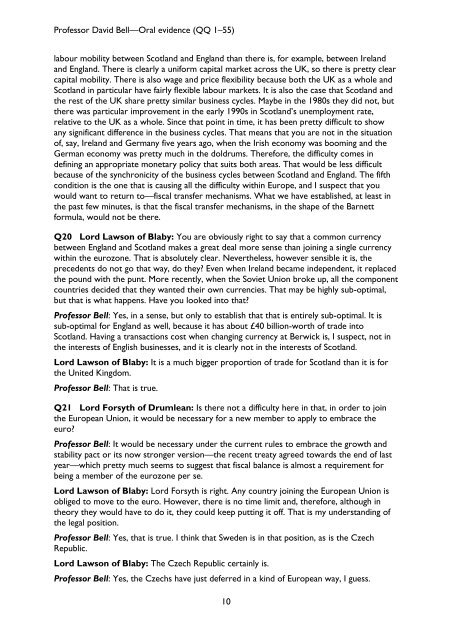SELECT COMMITTEE ON ECONOMIC AFFAIRS - Parliament
SELECT COMMITTEE ON ECONOMIC AFFAIRS - Parliament
SELECT COMMITTEE ON ECONOMIC AFFAIRS - Parliament
Create successful ePaper yourself
Turn your PDF publications into a flip-book with our unique Google optimized e-Paper software.
Professor David Bell—Oral evidence (QQ 1–55)<br />
labour mobility between Scotland and England than there is, for example, between Ireland<br />
and England. There is clearly a uniform capital market across the UK, so there is pretty clear<br />
capital mobility. There is also wage and price flexibility because both the UK as a whole and<br />
Scotland in particular have fairly flexible labour markets. It is also the case that Scotland and<br />
the rest of the UK share pretty similar business cycles. Maybe in the 1980s they did not, but<br />
there was particular improvement in the early 1990s in Scotland’s unemployment rate,<br />
relative to the UK as a whole. Since that point in time, it has been pretty difficult to show<br />
any significant difference in the business cycles. That means that you are not in the situation<br />
of, say, Ireland and Germany five years ago, when the Irish economy was booming and the<br />
German economy was pretty much in the doldrums. Therefore, the difficulty comes in<br />
defining an appropriate monetary policy that suits both areas. That would be less difficult<br />
because of the synchronicity of the business cycles between Scotland and England. The fifth<br />
condition is the one that is causing all the difficulty within Europe, and I suspect that you<br />
would want to return to—fiscal transfer mechanisms. What we have established, at least in<br />
the past few minutes, is that the fiscal transfer mechanisms, in the shape of the Barnett<br />
formula, would not be there.<br />
Q20 Lord Lawson of Blaby: You are obviously right to say that a common currency<br />
between England and Scotland makes a great deal more sense than joining a single currency<br />
within the eurozone. That is absolutely clear. Nevertheless, however sensible it is, the<br />
precedents do not go that way, do they? Even when Ireland became independent, it replaced<br />
the pound with the punt. More recently, when the Soviet Union broke up, all the component<br />
countries decided that they wanted their own currencies. That may be highly sub-optimal,<br />
but that is what happens. Have you looked into that?<br />
Professor Bell: Yes, in a sense, but only to establish that that is entirely sub-optimal. It is<br />
sub-optimal for England as well, because it has about £40 billion-worth of trade into<br />
Scotland. Having a transactions cost when changing currency at Berwick is, I suspect, not in<br />
the interests of English businesses, and it is clearly not in the interests of Scotland.<br />
Lord Lawson of Blaby: It is a much bigger proportion of trade for Scotland than it is for<br />
the United Kingdom.<br />
Professor Bell: That is true.<br />
Q21 Lord Forsyth of Drumlean: Is there not a difficulty here in that, in order to join<br />
the European Union, it would be necessary for a new member to apply to embrace the<br />
euro?<br />
Professor Bell: It would be necessary under the current rules to embrace the growth and<br />
stability pact or its now stronger version—the recent treaty agreed towards the end of last<br />
year—which pretty much seems to suggest that fiscal balance is almost a requirement for<br />
being a member of the eurozone per se.<br />
Lord Lawson of Blaby: Lord Forsyth is right. Any country joining the European Union is<br />
obliged to move to the euro. However, there is no time limit and, therefore, although in<br />
theory they would have to do it, they could keep putting it off. That is my understanding of<br />
the legal position.<br />
Professor Bell: Yes, that is true. I think that Sweden is in that position, as is the Czech<br />
Republic.<br />
Lord Lawson of Blaby: The Czech Republic certainly is.<br />
Professor Bell: Yes, the Czechs have just deferred in a kind of European way, I guess.<br />
10

















